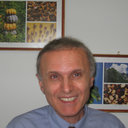Targeting oncogenic serine/threonine-protein kinase BRAF in cancer cells inhibits angiogenesis and abrogates hypoxia.
Nøgleord
Abstrakt
Carcinomas are comprised of transformed epithelial cells that are supported in their growth by a dedicated neovasculature. How the genetic milieu of the epithelial compartment influences tumor angiogenesis is largely unexplored. Drugs targeted to mutant cancer genes may act not only on tumor cells but also, directly or indirectly, on the surrounding stroma. We investigated the role of the BRAF(V600E) oncogene in tumor/vessel crosstalk and analyzed the effect of the BRAF inhibitor PLX4720 on tumor angiogenesis. Knock-in of the BRAF(V600E) allele into the genome of human epithelial cells triggered their angiogenic response. In cancer cells harboring oncogenic BRAF, the inhibitor PLX4720 switches off the ERK pathway and inhibits the expression of proangiogenic molecules. In tumor xenografts harboring the BRAF(V600E), PLX4720 extensively modifies the vascular network causing abrogation of hypoxia. Overall, our results provide a functional link between oncogenic BRAF and angiogenesis. Furthermore, they indicate how the tumor vasculature can be "indirectly" besieged through targeting of a genetic lesion to which the cancer cells are addicted.


